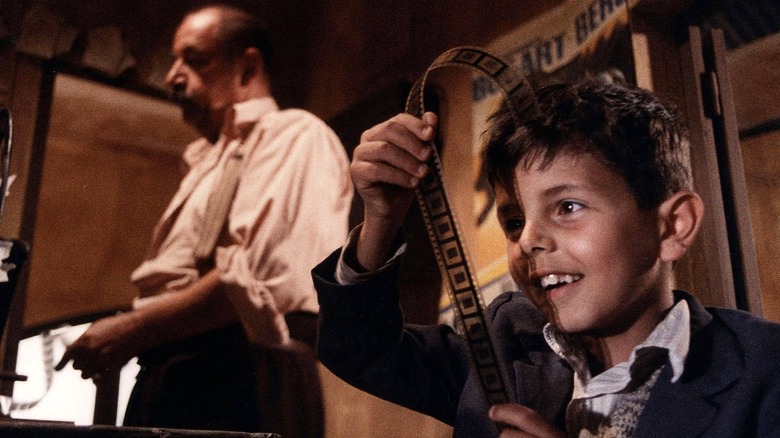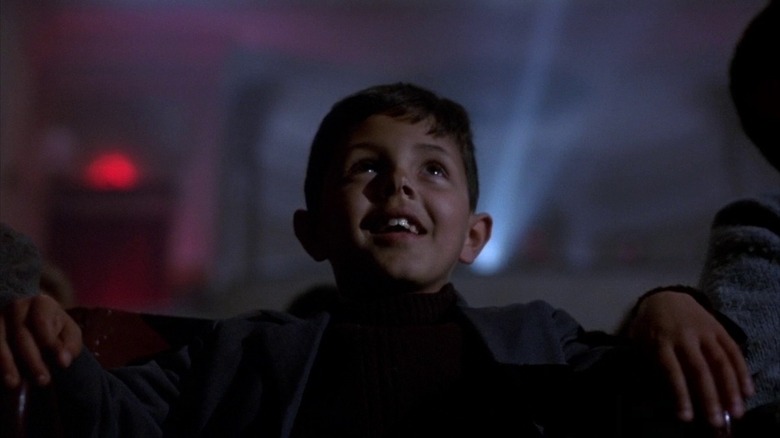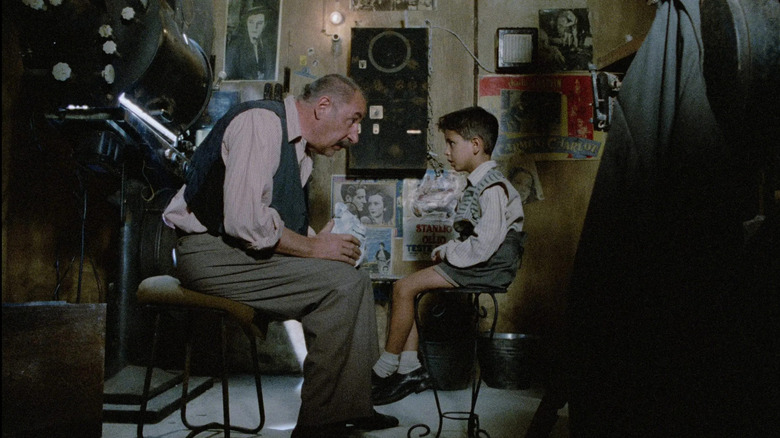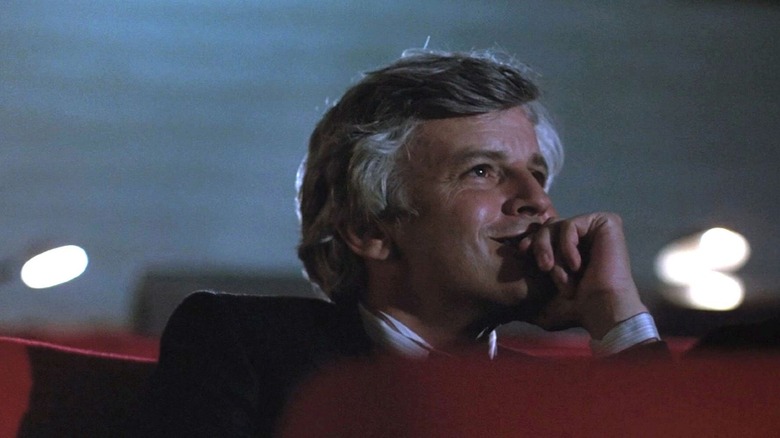
It doesn't take much to make me cry when it comes to movies. Whether it's a deathbed scene, a happy reunion, or a coach giving a motivational speech in an underdog sports movie, I'm close to blubbing every time. "It's a Wonderful Life," "The Remains of the Day," and "Atonement" are just a few movies that leave me in a puddle on the floor, and I even get emotional during films that aren't traditionally tear-jerking. I was welling up through much of "Jiro Dreams of Sushi," awed by the guy's lifelong dedication to his culinary art.
It's been tough over the years, watching movies with my partner who is as hard as nails when it comes to this kind of stuff. She takes some of the saddest scenes ever committed to film in her stride and I can feel her giving me the side-eye whenever I start getting choked up, which just makes things even worse.
This brings me to the film that gets me the most, "Cinema Paradiso." Giuseppe Tornatore's celebrated love letter to the silver screen was the first foreign language film I saw, opening my eyes to the possibilities of world cinema, and its famous ending gets my bottom lip wobbling just thinking about it. Still, it's an experience I put myself through repeatedly because I think it is one of the greatest movie endings ever.
The final scenes may seem relatively straightforward, but is there more to consider? Let's dig into that joyously bittersweet ending of Tornatore's cinematic love-in a little deeper.
So What Happens In Cinema Paradiso Again?

"Cinema Paradiso" opens in present-day Rome where meet Salvatore Di Vita (Jacques Perrin), a successful film director who has it all. He receives a message from back home saying that someone called Alfredo has passed away. He seems to take the news in his stride, but as he lays in bed with a storm building outside, we can see in his eyes that Alfredo meant the world to him.
Flashback to the small Sicilian town of Giancaldo just after World War II. Salvatore, nicknamed Toto (Salvatore Cascio), is a mischievous eight-year-old who is obsessed with movies. In between choirboy duties and running errands for his mum, whose husband is still missing in action, he spends every available moment at the local movie house, the Cinema Paradiso.
The priest censors new releases for anything too racy, which amounts to a peck on the cheek or a little bare flesh in his eyes. Up in the booth, grouchy projectionist Alfredo (Philippe Noiret) marks the offending scene so he can remove it later. He supposedly keeps the snippets of celluloid so he can splice them back into the reel when it's time to return the films.
Toto idolizes Alfredo and begs him to let him help out with the projector. Alfredo initially chases the boy away but eventually relents and they become good friends, the childless middle-aged man becoming a surrogate father for the boy.
Tragedy strikes when the extremely combustible celluloid causes a fire, leaving Alfredo blind. As Toto grows up, working the projector in his place, the old man insists he must leave his hometown behind forever if he wants to fulfill his dreams.
Nostalgia With A Purpose

"Cinema Paradiso" was Giuseppe Tornatore's passion project, tapping into his own experiences working the projector in his hometown movie house. He said (via The Hollywood Interview):
"I was lucky enough to grow up in Italy during the sixties and seventies and see such a huge variety of films, some masterpieces, some good, some terrible, that they were all an education for me...That was a time when you could see a new film by a master like Fellini, a Giallo by someone like Dario Argento, or a B-movie exploitation piece of s**t, but I learned something from them all."
Some sniffier critics took issue with the film's heart-on-sleeve nostalgia, but Tornatore's sentimental look at the movie-going experience of old speaks to the present, too. It celebrates the collective experience of movie-going, especially important in a small rural community where there are few other sources of entertainment or culture, and the joy of sitting in a theater and sharing those silver screen moments with a room full of people.
The often predicted demise of cinema has yet to come to pass, but the way we consume movies has changed drastically since "Cinema Paradiso" was released. Even home rentals have become a thing of the past as they've been superseded by streaming services, and modern cinema-goers are largely deprived of the variety Tornatore spoke of. Today's multiplexes might have a dozen screens but the offerings have become far more homogenized, and the atmosphere in a sprawling cinema complex is far different from the communal vibe of local fleapits that have largely vanished from existence.
Tornatore's nostalgia makes this point, and he makes no apologies for his sentimentality. His passion for cinema permeates every second, and "Cinema Paradiso" is a film absolutely bursting with love.
The Final Scene

Salvatore returns to Giancarlo for the first time in 30 years for Alfredo's funeral. His mother is now an old woman, the town has changed, and his visit coincides with the demolition of the Cinema Paradiso. It's a sad day for the townsfolk, watching the place that gave them so much joy reduced to rubble.
Alfredo's widow tells Salvatore how much the old man loved him, following his career with great pride. He also left him an old reel of film, which Salvatore watches in a private screening room back in Rome. Alone in the dark, he sinks into his seat when he realizes what it is: all those screen kisses that Alfredo cut out of the movies years before, spliced together one after another. Salvatore's tearful expression is a mixture of admiration, wonder, and adoration.
Perhaps inspired by Toto's success as a director, Alfredo's kiss reel was his way of expressing his love for movies, creating a montage truly beautiful in its artlessness. He was an uneducated man but his passion for cinema was pure, intuiting the right order to place this seemingly random collection of tender moments. The cumulative effect of all those kisses is overwhelming, almost transcendent.
The montage was also Alfredo's way of expressing his love for his protégé in terms that he knew Toto would understand and appreciate, and we see how important that message is to him as an adult. We sense that Salvatore has lost touch with his roots and the unadulterated joy of movies he felt as a child, and those few moments spent watching Alfredo's smooch reel transport him from the plush screening room where he sits alone right back to the rough-and-tumble Cinema Paradiso, leaving him awash with love and tears for his old friend and his childhood, wonderstruck by the magic of movies once again.
Read this next: The 15 Best Historical Epic Movies Ranked
The post Cinema Paradiso Ending Explained: Whatever You End Up Doing, Love It appeared first on /Film.
0 Commentaires